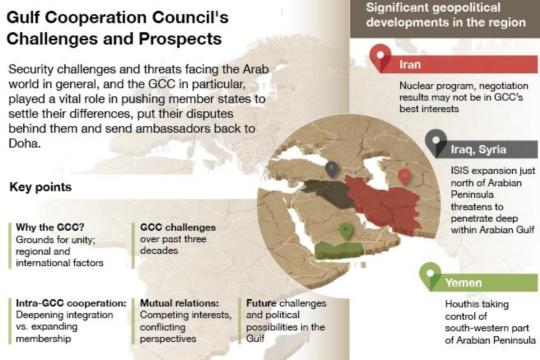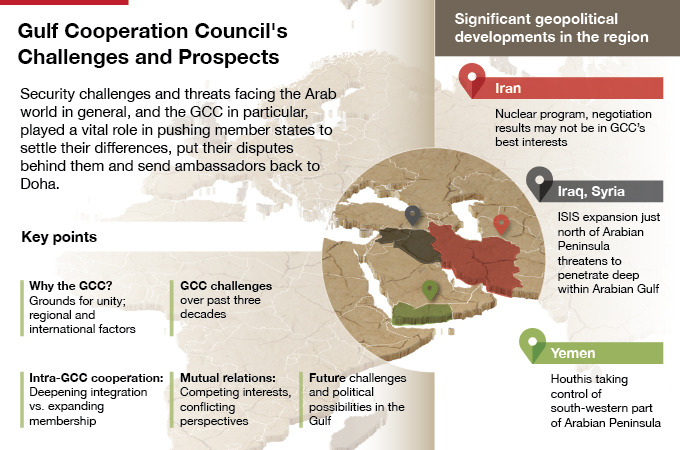
 |
| [AlJazeera] |
The onset of 2014 marked an unprecedented qualitative development in relations between the member states of the Gulf Cooperation Council. Bahrain, Saudi Arabia and the United Arab Emirates recalled their ambassadors from Qatar. These events had seriously grave ramifications for the future of the GCC as a leading regional organisation in the Arab world.
The ambassadorial crisis was ironed out after GCC leaders met in Riyadh on 16 November 2014, and the ambassadors were all back in Doha by the time the 35th annual GCC summit was held on 9 December. But that diplomatic crisis, unprecedented in the GCC’s history, underlined the need for a re-evaluation of the GCC and its achievements since it was established in 1981. The crisis highlighted a number of key differences between member states over various regional and international issues. Central here are their views on the repercussions and reverberations of what is known as the Arab Spring. Other core issues pertain to progress made towards the hoped-for integration, co-ordination and co-operation at the political, economic, security, and military, not to mention foreign policy levels.
The challenges and threats to regional security – and to that of the GCC countries in particular – originating from regional neighbours, certainly played a significant role in galvanising reconciliation among the member states, and in ensuring the ambassadors’ return to Doha. A trio of geopolitical developments affected the region in the fourth quarter of 2014:
• The expansion of the so-called Islamic State (IS) just north of the Arabian Peninsula, that is, in Syria and Iraq, threatened to penetrate deep into the whole region.
• Houthis seized control of Yemen in the southern part of the Peninsula.
• Continued negotiations between the P5+1 states (Russia, China, France, the United Kingdom and the United States, plus Germany) and Iran, the outcomes of which may not be in the best interests of GCC member states in terms of the regional balance of power.
By publishing this collection, AlJazeera Centre for Studies aims to present an assessment of the history of the GCC since its inception, and to forecast possible scenarios for its future in light of recent regional and international developments. The collection encompasses five main points, which have been tackled by researchers and experts on GCC affairs.
1. The GCC’s purpose and basis for unity in a regional and international context
Chapters in this section cover reasons for the GCC’s existence (the so-called “official story” of its inception), GCC unity in the eyes of the masses (public opinion), and principles governing inter-GCC relationships in the current regional and international contexts.
Dr. Omar Al Hassan discusses the official viewpoints of member states on their reasons and premises for establishing the GCC in the first chapter, while Ghassan Alshihaby analyses viewpoints of GCC citizens on the idea of unity and how the local media shape public opinion on the GCC in the second chapter.
2. Challenges to GCC co-operation over three decades
The chapters in this section cover economic co-operation and integration, where the GCC’s achievements have been impressive, as well as security and military co-operation, where not as much progress has been made.
In a chapter titled, “GCC's Economic Cooperation and Integration: Achievements and Hurdles”, Dr. Khalid Shams Abdulqader delves into one of the most important avenues of co-operation between member states – the economy. He analyses what has been achieved, while pointing out the hurdles that have stood in the way of fuller economic integration. Dr. Zafer Alajmi then attempts to answer the question posed in the title of his chapter, “Gulf Military Cooperation: Tangible Gains or Limited Results?”
3. GCC cooperation: deepening integration vs. widening membership.
In light of a high-pressure regional context that forces the GCC states to constantly adjust their geopolitical positioning to protect themselves from possible challenges and threats, doctors Yahya Alzahrani and Saud Al Tamamy discuss address issues related to whether there is a need for the GCC, and what shape it might take in future. In his chapter, Dr. Alzahrani attempts to answer the question of whether GCC unity is necessary or optional, while Dr. Al Tamamy, considers the possibilities and restrictions governing the possible expansion of the GCC’s membership in his chapter.
4. Inter-GCC relations: contradictory interests and contrasting viewpoints
Islam Khaled Hassan tackles the reasons and possible solutions for disputes between member states, focusing on the diplomatic crisis in 2014, when Saudi Arabia, the United Arab Emirates and Bahrain recalled their ambassadors from Doha.
5. The GCC and future challenges.
Dr. Ahmed Alazdi raises the very serious issue of the impact of political sectarianism and terrorism on national and regional security within the GCC countries. Dr. Taha Al-Farra discusses the crucial matter of future water security in the GCC, while Dr. Jassim Hussain tackles the hot topic of alternative energy and the future of oil and gas in the GCC.
The dossier ends with a summary of results from all chapters.
_________________________________________________
*Dr. Jamal Abdullah is a researcher at AlJazeera Centre for Studies specialising in Gulf affairs.